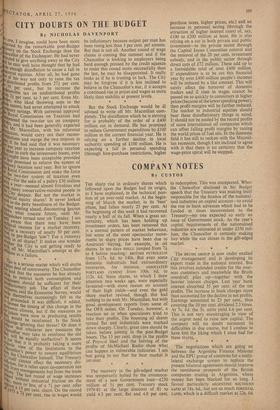COMPANY NOTES
By CUSTOS
THE sharp rise in ordinary shares which followed upon the Budget had its origin, as I have explained, in the technical posi tion of an over-sold market. At the begin- ning of March the market, in its 'bear' phase, had fallen nearly 25 per cent. At the beginning of this week it had recovered nearly a half of its fall. When a great un- certainty, which has been holding up investment orders, has been removed this is a normal pattern of market behaviour, but some of the most spectacular move- ments in share prices have been due to American• buying, for example, in oil shares. In ten days SHELL jumped from 74 to 8 before reacting: BRITISH PETROLEUM from 117s. 6d. to 140s. But even some domestic industrials had extraordinary recoveries, for instance, ASSOCIATED PORTLAND CEMENT from 100s. 6d. to 112s. 6d. Store shares, to which I drew attention two weeks ago, were especially favoured—with more reason on account of their high yields—and even the gold share market revived, though this had nothing to do with Mr. Macmillan, but with good development reports from some of the OFS mines. On Tuesday, however, a reaction set in when speculators tried to take their profits. The booming oil shares turned flat and industrials were marked down sharply. Clearly, great care should be taken before joining in the post-Budget boom. The 15 per cent. drop in the profits of Pressed Steel and the halving of the profits of McMichael Radio show what can happen in vulnerable industries. I am 'not going to say that the bear market is yet over.
* * *
The recovery in the gilt-edged market was temporarily halted by the announce- ment of a new Government loan—£250 million of 34 per cent. Treasury stock 1979-81 at the large discount of 81 to yield 4.3 per cent. flat and 4.8 per cent.
to redemption. This was unexpected. When the Chancellor disclosed in his Budget speech that the Treasury was making itself responsible for the finance of the national- ised industries on capital account—to avoid the rise in bank advances which had to be funded at times inconvenient to the Treasury—no one expected so early an issue of Government stock. As the year's capital requirements of the nationalised industries are estimated at under £350 mil- lion, the Chancellor is certainly making hay while the sun shines in the gilt-edged market.
*• * The BRUSH GROUP is now under exalted City management and is developing its export trade in the national interest. But this involves extended credits for the over- seas customers and meanwhile the Brush overdraft piles up—together with the heavier interest charges. Last year bank interest absorbed 35 per cent. of the net profits. The increase in bank charges more than accounted for the decline in net profits. Earnings amounted to 23 per cent., thus covering the 10 per cent. dividend 2.3 times. At 7s. 6d. the 5s. units yield 6.6 per cent. This is not very encouraging in view of the urgent need to raise new capital. The company will no doubt surmount its difficulties in due course, but 1 confess to have lost the liking which I once had for these shares.
* * *
The negotiations which are going on between the Argentine Finance Minister and the EPU group of countries for a multi- lateral exchange system to replace the present bilateral agreements should improve the remittance prospects of the British companies trading in Argentina, where money has been blocked for so long. I favour particularly ARGENTINE SOUTHERN LAND at 18s. 6d., but not so much FORESTAL LAND, which is a difficult market at 22s. 6d.










































 Previous page
Previous page